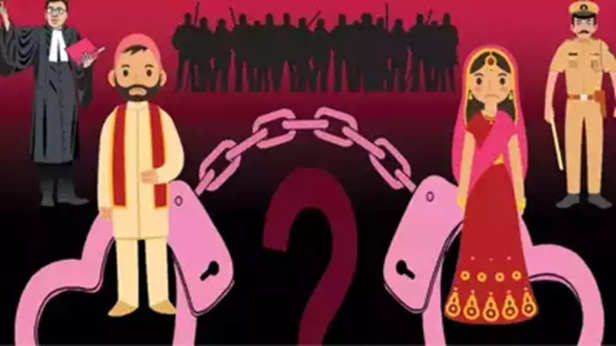1. The Tradition of Arranged Marriages

which is better
For centuries, arranged marriages have been the norm in India. Parents believe that they can choose a more compatible partner for their child based on factors such as family background, caste, financial status, and horoscopes. Love marriages challenge this tradition, making parents feel that their authority and experience are being disregarded. They also fear that love marriages, driven by emotions, may not be as stable as arranged ones.
2. Caste and Religion: Barriers to Acceptance

caste barrier in marriage
( Image credit : Times Life Bureau )
In India, caste and religion still play a significant role in marriages. Many parents oppose love marriages because they fear their child may choose a partner from a different caste or religion, leading to social criticism and conflicts. Inter-caste and inter-religious marriages are often seen as breaking social norms, which can result in ostracization from the community or family disputes.
3. Fear of Social Judgment and Family Honor
Indian society places a high value on reputation and family honor. Parents worry about what relatives, neighbors, and the community will say if their child marries for love instead of following tradition. The phrase
"Log kya kahenge?" (What will people say?) often drives opposition to love marriages. Many parents fear that going against societal norms will damage their family's respectability.
4. Financial and Social Concerns
Marriages in India are not just about love; they are also seen as financial and social alliances. Parents evaluate a match based on economic stability and family reputation. If their child’s chosen partner doesn’t meet these expectations, they worry it may lead to financial struggles or a lower social standing. Additionally, arranged marriages often involve negotiations that can minimize financial risks, whereas love marriages may not.
5. The Myth That Love Marriages Are Unstable
Many Indian parents believe that love marriages don’t last because they are based on emotions rather than long-term compatibility. Arranged marriages, which prioritize practical considerations, are seen as more stable. Parents fear that once the initial excitement fades, love marriages might lead to conflicts or divorce, bringing shame to the family.
6. Patriarchy and Gender Expectations
In traditional Indian families, daughters are expected to obey their parents and marry according to their family's wishes. When a woman chooses her own partner, it is sometimes seen as an act of rebellion against cultural values. Even for men, love marriages are only accepted if they conform to family expectations regarding caste, religion, and financial status. This deep-rooted patriarchy makes parents hesitant to accept love marriages.
7. Fear of Losing Control Over Children
In an arranged marriage, parents play an active role in selecting the spouse, strengthening family ties. However, in love marriages, parents may feel sidelined, fearing that they will lose influence over their child’s life. This loss of control creates resistance, as parents worry that their child may distance themselves from the family after marriage.
8. Lack of Exposure to Successful Love Marriages
Many parents who oppose love marriages have only seen arranged marriages in their own families. They may not have exposure to successful love marriages, leading them to believe that such unions are risky. However, with increasing education and globalization, younger generations are challenging these outdated beliefs, and love marriages are becoming more common, especially in urban areas.
How Can the Gap Be Bridged?
1. Open Communication
Instead of making love marriage a battle between generations, children should have open and honest conversations with their parents. Discussing values, compatibility, and long-term plans can help ease their fears.
2. Educating Parents Through Positive Examples
Many Indian parents fear love marriages because they don’t see enough successful examples. Introducing them to real-life couples who have built strong relationships despite societal opposition can change their perception.
3. Involving a Trusted Mediator
Sometimes, bringing in a mediator—a relative, family friend, or counselor—can help parents see the situation from a different perspective. Someone they trust may be able to convince them to be more open-minded.
4. Giving Parents Time to Accept the Idea
Many parents initially resist love marriages but soften their stance over time. If they are given space to process the idea and see their child's happiness, they may gradually come around to the decision.
5. Proving Stability and Maturity
Parents often worry that love marriages are impulsive. Demonstrating financial stability, responsibility, and long-term compatibility can reassure them that the relationship is not just based on emotions but on a solid foundation.
6. Blending Tradition With Modernity
Many Indian parents fear losing their traditions if their child opts for a love marriage. A good way to ease this fear is by incorporating cultural and traditional elements into the wedding and family interactions. Showing respect for customs while choosing a life partner can help strike a balance between love and tradition.
The resistance to love marriages among Indian parents is deeply rooted in tradition, societal expectations, and concerns about family honor. However, as India modernizes and young people assert their independence, mindsets are gradually changing. While arranged marriages still dominate, love marriages signify a shift towards individual choice and personal happiness.
Bridging the gap between generations requires patience, understanding, and communication. If parents and children engage in open discussions and work together to address concerns, the rigid barriers to love marriages can eventually be broken. After all, marriage is about finding a lifelong companion, and whether arranged or love, its success depends on mutual respect, understanding, and commitment.


